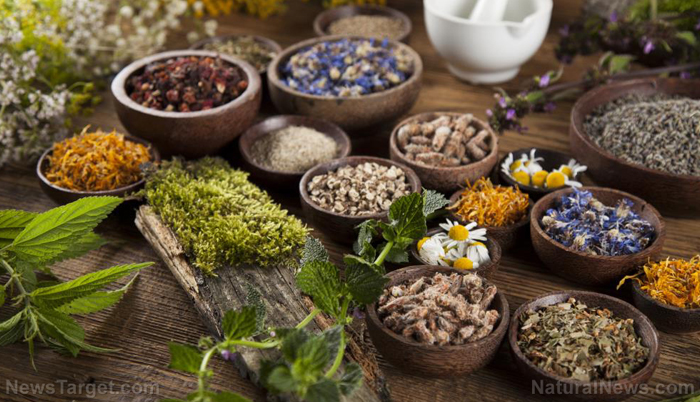![]() Home > Health
Home > Health
9 Herbs That Can Support Mental Health

News Target | Natural News
![]() February 2nd, 2023 | 10:58 AM |
February 2nd, 2023 | 10:58 AM | ![]() 364 views
364 views
NATURALNEWS
Medicinal herbs offer amazing benefits not only for your physical health, but also for your mental health. Here are nine herbs that can help support a positive mood:
Chamomile (Matricaria recutita)
A study published in the journal Alternative Therapies in Health and Medicine explored data from a 2009 clinical chamomile trial involving 57 humans to determine if chamomile provided clinically meaningful antidepressant activity versus that of a placebo.
Of the 57 participants, 19 had anxiety with comorbid depression, 16 had anxiety with a past history of depression and 22 had anxiety with no current or past depression.
Researchers observed a significantly greater reduction over time in total Hamilton Depression Rating (HAM-D) scores and HAM-D core mood item scores for chamomile versus placebo in all participants – indicating that chamomile provided clinically meaningful antidepressant activity that occurs in addition to its previously observed anxiolytic activity.
Ginseng (Panax quinquefolius L.)
A study published in the Journal of Ginseng Research showed that ginseng effectively suppressed stress-related depression and anxiety and demonstrated similar levels of efficacy as the commercially available anti-depressant, fluoxetine.
In addition, the study demonstrated ginseng’s efficacy in memory improvement and in the direct prevention of degenerative brain diseases, such as Alzheimer’s. Researchers indicated that the neuroprotective effect of ginseng is useful in the prevention of depression and amelioration of anxiety in elderly patients treated with anxiolytics.
Kava kava (Piper methysticum)
In addition to its ceremonial uses in the Pacific Islands for hundreds of years, kava is best known to elevate mood, well-being and contentment and produce a feeling of relaxation, similar to alcohol, according to Mount Sinai Health System.
An article published by Mental Health America reported that more than a dozen placebo-controlled studies have shown kava to be effective with good tolerability for the treatment of generalized anxiety. However, the authors pointed out that while kava is generally safe for short-term use, it can cause catastrophic liver damage in rare cases.
Lavender (Lavandula angustifolia)
A study published in the journal Evidence-based Complementary and Alternative Medicine showed that lavender oil produced significant anti-anxiety effects. It also found lavender as an excellent natural remedy to treat insomnia and improve sleep quality.
Researchers suggested that lavender should be used cautiously or avoided in patients with known allergies to lavender.
Rhodiola (Rhodiola rosea)
A study published in Molecules supported rhodiola’s efficacy in alleviating various aspects of life-stress symptoms and stress-induced conditions based on encouraging clinical evidence.
Researchers reported that individuals in the R. rosea treatment groups, aged 18-70 years, with overall depression, together with insomnia, emotional instability and somatization, significantly improved following medication (one group receiving two R. rosea extract tablets (340mg/day) and a second group receiving two tablets twice per day (680mg/day).
Further, the Hamilton Depression Rating (HAM-D) scores in both R. rosea treatment groups significantly improved – showing that the standardized extract from R. rosea possesses anti-depressant activity in 91 patients with mild-to-moderate depression.
Saffron (Crocus sativus)
A study published in the Journal of Affective Disorders indicated that saffron exerts anti-depressant and anxiolytic effects in adults with mild-to-moderate depression and represents a productive and safe treatment.
Researchers concluded that saffron exerts antidepressant effects comparable to those of pharmaceutical antidepressants, such as citalopram, fluoxetine and imipramine, with fewer observed side effects.
A randomized controlled trial published in the same journal found that administering standardized saffron for eight weeks improved anxiety and depressive symptoms in youth, aged 12-16 years, with mild-to-moderate symptoms.
St. John’s wort (Hypericum perforatum)
A study published in the journal Neuropsychiatric Disease and Treatment showed that both St. John’s wort extract and selective serotonin reuptake inhibitors were effective in treating mild-to-moderate depression in more than 3,000 patients.
The study also showed that St. John’s wort extract had superior safety in the management of patients with depression as evidenced by a significantly lower rate of adverse effects and fewer withdrawals due to adverse events.
Rosemary (Rosmarinus officinalis L.)
An article published by Intrepid Mental Wellness PLLC said that simply inhaling the aroma of rosemary essential oil can lower levels of the stress hormone cortisol in your blood. The authors suggested that you can combat stress instantly using an essential oil diffuser or even by just inhaling an open bottle of rosemary essential oil.
To create an anti-stress aromatherapy spray, simply combine 10 drops of rosemary essential oil with six tablespoons of water and two tablespoons of vodka in a small spray bottle.
Valerian (Valeriana officinalis)
Published in the Oman Medical Journal, a study of 39 people undergoing hemodialysis found that they had significant reductions in anxiety symptoms after taking 530 mg of valerian root one hour before bedtime for one month, compared with a placebo.
Researchers also noted that the treatment significantly improved sleep quality and depression.
In addition to valerian root’s anti-anxiety effects, a study published in the Journal of Complementary & Integrative Medicine indicated that it helps with chronic conditions characterized by anxious behaviors, such as obsessive-compulsive disorder.
Source:
courtesy of NATURALNEWS
by Olivia Cook
If you have any stories or news that you would like to share with the global online community, please feel free to share it with us by contacting us directly at [email protected]